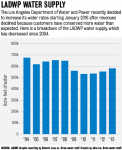A city commission approved an additional utility charge Tuesday after the Los Angeles Department of Water and Power collected $110 million less than expected, following successful water conservation efforts over the past year.
On average, residents will be charged an additional 3.6 percent, or about $1.80 a month, for the 2016 calendar year.
The Los Angeles Water Rates ordinance allows the LADWP to increase its rates in order to bring its revenue up to the minimum necessary to provide services, according to a LADWP statement.
Though the extra charge will expire by the end of 2016, the department is advocating for rate hikes over the next five years that would incur a 34 percent increase in the average user’s bill by 2021, according to the Los Angeles Times.
Stephanie Pincetl, director of the California Center for Sustainable Communities at UCLA, said she thinks water utility companies have very few options during the drought because reduced water usage increases infrastructure costs while decreasing revenue.
“These utilities weren’t created when we needed to reduce water use,” Pincetl said. “You have a system built on selling water on a regular basis when there is not enough water, and even less going forward.”
Sandy Brown, president of the Holmby Westwood Property Owners Association, said she thinks the LADWP has a deficit because it constantly needs to repair what she calls a decaying infrastructure.
Brown said she does not mind increased rates if the revenue is used to maintain infrastructure. She added that she thinks the city will need to continue increasing water rates and the cost of living in Los Angeles if it does not prioritize infrastructure.
Steven Sann, chair of the Westwood Community Council , said he thinks the new policy is unfair because it penalizes residents when they should be rewarded with financial incentives to continue saving water.
Pincetl said she thinks residents will be confused to see their bills rising despite significant water savings.
“For utilities, it’s really hard to make the adjustment in a way that people will find fair and equitable,” she added.
Pincetl said California Proposition 218, which was passed in 1996, prevents utility companies from raising rates unless the cost of the utilities themselves have increased. She said she thinks this law makes it hard for LADWP to respond to necessary changes in urban water usage and to develop resources like water recycling plants or turf subsidies that aid water conservation.
Sann said he thinks graduated water rates would be the best way for the city to recover lost revenue.
“If they need to raise rates and revenue, then they should be raising money from the water hogs, not the water savers,” Sann said. “If we have to fix the problem at the state level, that’s where we need to put our energy.”
Sann added that he thinks the extra charge will elicit a loss of public confidence in the city government.
Pincetl said she thinks LADWP officials haven’t communicated enough with customers about increasing their rates, after years of encouraging water conservation efforts.
“They might not know the answers themselves, but having some transparency would be helpful,” Pincetl said.

Instead of revenue, you should have said “profits”…because that is what our “utility” is concerned about.